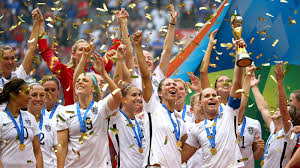By Samindra Kunti
February 26 – New Zealand have expressed their interest in hosting the 2023 Women’s World Cup. Last week FIFA launched the bidding process with Japan, Australia and South Africa among the other member associations that have declared an interest so far.
New Zealand Football interim chief executive Andrew Pragnell said: “There’s strong interest from our side. The real telling date will be the 18th of March, when Fifa will release the bid documents. That’s really important for us, because the clincher will be ensuring that our stadiums are fit for purpose and meet the bid specifications. We’re really excited and interested, but the 18th of March and what’s in the bid documents will be really critical.”
The deadline for expressions of interest is March 15, when the governing body’s Council will meet in Miami.
New Zealand had also shown interest in hosting this year’s Women’s World Cup alongside England, South Korea and South Africa, but withdrew at an early stage from the race in 2014. It’s first interest in hosting the 2023 Women’s World Cup was expressed as far back as 2015.
In the past New Zealand have staged the 2015 U-20 World Cup and it has been a long-term target for the Kiwis to bring back another FIFA tournament to the country. They also hosted the 1999 U-17 World Cup and the 2008 U-17 Women’ World Cup.
“I think our strength lies in a really strong track record of hosting events,” said Pragnell. “What we’re dealing with here is an event that’s growing at a quite significant pace. We’re optimistic and enthused and we’ll work with FIFA to make sure we fully understand what their expectations are and to find out, if there are any areas of tension, where some flexibility can be applied.”
In 2021 New Zealand will host the women’s cricket and rugby World Cups. The country is also hoping to stage the Netball World Cup in 2023.
“It’s the logical next step in a lot of respects,” he said. “We’ve got a good track record in terms of event hosting; we’ve got a number of other major sporting events, including netball, cricket, and rugby coinciding around that period; it talks really well to the government’s agenda in ensuring there’s gender equality across the sporting sphere; and I think it’s real opportunity to put ourselves on the map.”
If New Zealand will bid for the 24-team tournament, they will face stiff competition from Japan and local rivals Australia. Football Federation Australia (FFA) first announced its intention to bid in June 2017 and reaffirmed its commitment last week. The Australian governing body has provided $5 million in funding to prepare for a formal bid submission. “Australia is strongly aligned to FIFA’s global vision for women’s football, and committed to growing the game across Asia-Pacific region. With our strong record of successfully hosting major events including the AFC Asian Cup 2015, we are confident of submitting a compelling bid for Australia to host FIFA Women’s World Cup 2023,” said FFA chairman Chris Nikou.
The Japanese Football Association (JFA) also wants to act on a long-standing resolution made by its board of directors in 2013 to host the women’s game flagship tournament. “We hope (the bid) can be realized in cooperation with the related ministries and agencies,” said JFA president Kozo Tashima.
South Africa will also join the race. Back in December SAFA president Danny Jordaan said it’s South Africa’s time to host the Women’s World Cup. Africa has never hosted a women’s World Cup, but the women’s game has received a popularity boost in South Africa as Banyana Banyana have qualified for the finals in France.
On March 18 FIFA will dispatch bid registration documents to interested associations, outlining what will be required from bidders to organise the competition. The FIFA Council will vote to award the hosting rights in March 2020, a choice FIFA has faced criticism for as the men’s World Cup is no longer decided by secret ballot.
Contact the writer of this story, Samindra Kunti, at moc.l1714074401labto1714074401ofdlr1714074401owedi1714074401sni@o1714074401fni1714074401

